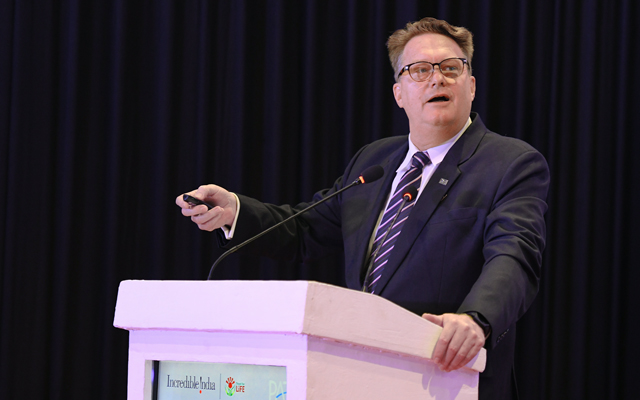PATA chair Peter Semone delivered a sobering message in his opening keynote at PTM Forum, held on October 4 in conjunction with PATA Travel Mart 2023 in New Delhi: the joint existential threats of climate change and socio-political and geopolitical unrest could destabilise global well-being and devastate the travel and tourism industry.
“The world is entering a critical time. We are living in a time where opportunities are boundless. However, risks of devastating crises that can destabilise global well-being are at an all-time high,” he stated.

“I don’t have to explain to you the pain Covid brought across the globe, but that could turn out to be nothing compared to what we have to deal with going forward,” he added.
Semone was quick to point out that his address was not meant to be a “doomsday” warning; instead, he hoped to inspire members of the travel and tourism industry to be “a little more proactive because we – the travel and tourism industry – can be the solution to these problems”.
“Think about this: without nature, there is no tourism; without peace, there is no tourism,” said Semone.
He noted that the absence of tourism would leave a trail of disrupted jobs and damaged economies, especially in less developed countries – as the Covid pandemic disruption had shown.
Furthermore, without tourism, it would be even harder to achieve the United Nations Sustainable Development Goals (UNSDGs).
He warned against thinking that the implementation of UNSDGs should be someone else’s job.
“According to the United Nations, failure to achieve the UNSDGs may fuel greater political instability, upend economies, and lead to irreversible damage to the natural environment. If that happens, travel and tourism will be decimated,” he said, urging a change in mindset that recognises sustainability as a responsibility for all and one that is “imperative of our times”.
He also referenced the recent UNWTO’s World Tourism Day as an example of the industry’s ability to inspire world peace. He noted that the event, hosted in Saudi Arabia’s Riyadh, was attended by 500,000 public and private officials, including an Israeli delegation. The Saudi Arabia tourism ministry pushed messages of tourism and peace.
“I have been in tourism for a long time, and I recognise this as a watershed moment. Our industry is super important for mitigating socio-political and geopolitical unrest,” he reflected.
“As members of PATA, we can be a catalyst for (positive) change,” he said, adding that the diverse Asia-Pacific region could set the ideal example for the world in the areas of sustainability as well as socio-political and geopolitical stability.
“Our region is like a living museum, with an emporium of natural and culture assets that is unlike any other place on Earth. If our part of the world – where we have a mix of religions, cultures and people – can show peace, we can set an example for the rest of the world.”
Concluding his keynote, Semone suggested making 2026 the Year of Peace Tourism, and to show that tourism could well be part of the solution for world peace.
The year will coincide with PATA’s 75th anniversary.
“PATA could partner with UN members and alliances of civilisations to organise events aimed at reducing cross cultural tensions and build bridges between communities globally,” he said.




















